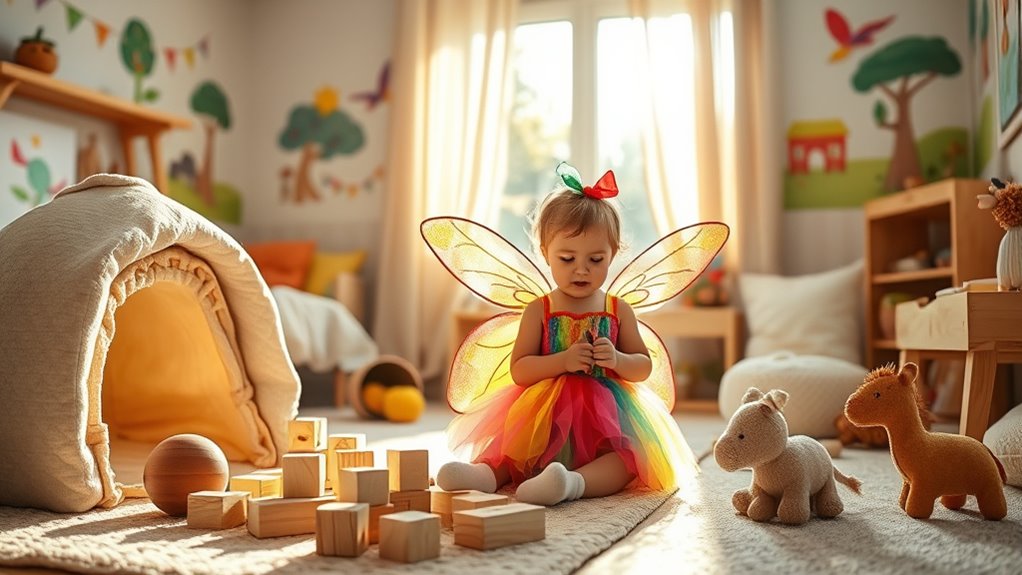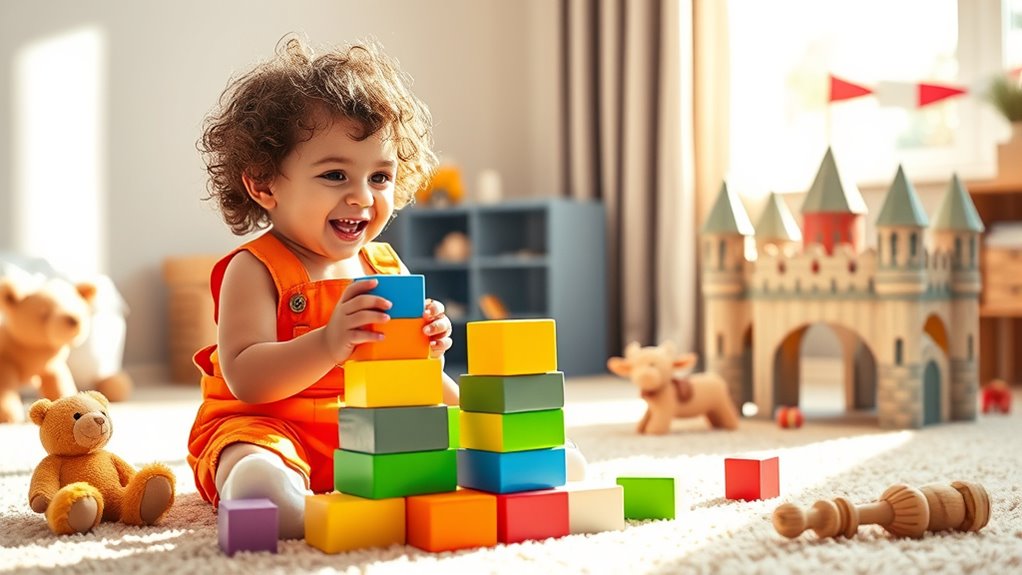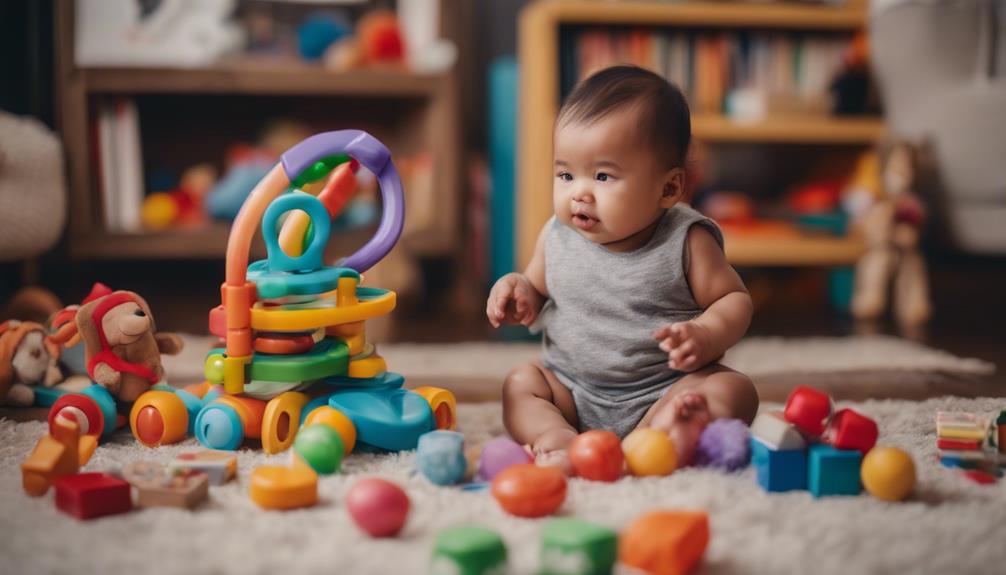Imaginative play is essential for your toddler’s brain development, helping strengthen neural connections across different areas. When your child engages in creative storytelling, role-playing, and sensory exploration, they boost cognitive skills like problem-solving, language, and emotional understanding. Plus, it fosters social skills like sharing and empathy. By supporting their imaginative activities and providing diverse play materials, you prepare their mind for future learning. Keep exploring how these playful experiences can truly shape their growth.
Key Takeaways
- Imaginative play activates neural networks, strengthening memory, problem-solving, and creative thinking skills in toddlers.
- Role-play enhances vocabulary, language development, and social-emotional understanding through storytelling and scenario exploration.
- Engaging in pretend scenarios fosters cognitive flexibility, decision-making, and emotional regulation.
- Cooperative play with peers promotes social skills, empathy, and neural connections related to communication.
- Sensory-rich environments support brain growth by stimulating multiple senses and encouraging exploration and innovation.
The Role of Imagination in Early Brain Growth

Imagination plays a crucial role in early brain growth by actively engaging a toddler’s developing neural networks. When you encourage creative storytelling, you’re helping your child build connections between different parts of their brain, strengthening memory and cognitive skills. As they invent stories or pretend to be someone else, they practice retrieving and organizing information, which boosts their ability to remember details later. Imaginative play stimulates neural pathways involved in problem-solving and emotional understanding, laying a foundation for more complex thinking. Additionally, color accuracy impacts how vividly children perceive their imaginary worlds, making the experience more engaging and memorable. By fostering a rich environment for your toddler’s imagination, you support their brain’s natural growth, helping them develop essential cognitive skills that will serve as a base for future learning and social interactions. Encouraging diverse and vivid imaginative scenarios can further enhance neural connectivity, promoting overall cognitive development. Incorporating elements like sensory input can also deepen engagement and reinforce neural connections during play. Moreover, understanding the importance of brain development can guide parents in choosing activities that optimize neural growth.
How Pretend Play Enhances Cognitive Skills

When your child engages in pretend play, it sparks their imagination and encourages creative thinking. This type of play also helps them solve problems more effectively and develop stronger language skills. By exploring different roles and scenarios, your toddler builds vital cognitive abilities that support their overall growth. Additionally, engaging in imaginative play can foster social skills and emotional intelligence as children navigate various interactions and emotions during their pretend scenarios variety of materials available.
Stimulates Imagination Growth
Engaging in pretend play considerably boosts a toddler’s cognitive development by encouraging them to think creatively and solve problems. When you encourage your child to explore fantasy worlds, they learn to imagine scenarios beyond their everyday experiences. This process fosters their ability to develop storytelling techniques, allowing them to craft narratives and understand sequences. As they invent characters and plotlines, their imagination expands, fueling curiosity and mental flexibility. These activities help children visualize possibilities and experiment with ideas, strengthening neural connections related to creativity. By immersing themselves in different roles and stories, toddlers activate their brains’ capacity to generate new concepts, laying a solid foundation for ongoing imaginative growth. Additionally, incorporating themed play, such as integrating Vetted – Flat Iron Bike concepts into their stories, can further stimulate their creative thinking. This imaginative engagement promotes not only fun but also vital cognitive skills essential for future learning. Engaging in diverse types of pretend play can also enhance problem-solving abilities, supporting their overall mental development.
Boosts Problem-Solving Skills
Pretend play naturally encourages toddlers to think critically and solve problems as they create and navigate new scenarios. This process strengthens their cognitive skills by challenging them to adapt and find solutions. Through imaginative scenarios, your child develops creativity and innovation, learning to approach challenges from different angles. They also gain cultural awareness by exploring diverse roles and customs within their play. To visualize this, consider the table:
| Scenario | Problem Solving | Skill Development |
|---|---|---|
| Playing restaurant | Deciding menu items | Creativity, decision-making |
| Superhero adventures | Overcoming obstacles | Critical thinking |
| Family role-play | Sharing and cooperation | Social skills |
These activities boost your child’s ability to analyze situations and develop effective solutions, laying a strong foundation for future learning.
Enhances Language Development
Imaginative play actively boosts toddlers’ language development by encouraging them to use and expand their vocabulary, practice new sentence structures, and communicate their ideas clearly. This process helps them reach key language milestones more confidently. During pretend play, you’ll notice your child:
- Introducing new words, aiding vocabulary expansion.
- Using complete sentences to describe scenarios or objects.
- Asking questions to deepen understanding and practice conversation.
- Role-playing different characters, which enhances expressive language skills.
- Engaging with remote hackathons, which can introduce them to new storytelling ideas and collaborative play techniques. Additionally, engaging in various imaginative activities supports cognitive and social development by fostering creativity and problem-solving skills. Recognizing the importance of language milestones can help parents and caregivers guide children effectively through their developmental stages. Incorporating coastal-themed pretend scenarios, such as beach visits or ocean adventures, can further stimulate their imagination and vocabulary related to nature and the environment. These activities make language learning engaging and practical.
Furthermore, understanding how Bollywood Legends have influenced cultural narratives can inspire children to explore storytelling and expressive arts from a young age. By immersing themselves in imaginative scenarios, toddlers strengthen their communication skills, building a solid foundation for future learning and social interaction.
The Impact of Imaginative Scenarios on Emotional Development

Imaginative scenarios help your toddler develop empathy as they take on different roles and see the world through others’ eyes. When they express feelings freely during play, they learn to understand and manage their emotions better. These experiences also build emotional resilience, helping them handle challenges with confidence. Additionally, engaging in imaginative play can foster emotional regulation skills that are essential for healthy social interactions. According to Louisiana alimony laws, such play can also influence a child’s understanding of fairness and relationships, contributing to their overall emotional intelligence. Moreover, incorporating eco-friendly practices into their play scenarios can teach children the importance of sustainability and environmental consciousness from an early age. Incorporating diverse diverse crypto assets into their play scenarios can further expand their understanding of different perspectives and risk factors, preparing them for complex decision-making. Recognizing the role of aesthetic hooks and wall organization in creating engaging play environments can also enhance their imaginative experiences and spatial awareness.
Empathy Through Role Play
Role play allows toddlers to step into different perspectives, helping them practice understanding others’ feelings. This activity is key to fostering empathy development and emotional understanding. As they imagine being a doctor, parent, or friend, they learn to recognize emotions and respond appropriately. Consider these ways role play enhances emotional growth:
- It encourages kids to see situations from others’ viewpoints, boosting empathy.
- It helps them identify and label emotions, building emotional vocabulary.
- It teaches patience and compassion through shared narratives.
- It strengthens social skills by practicing cooperation and turn-taking.
Through these scenarios, your toddler develops a deeper emotional awareness, laying the foundation for healthy relationships and emotional intelligence. Role play is a powerful tool for nurturing empathy and understanding in early childhood.
Expressing Feelings Freely
When children engage in pretend play, they often feel more comfortable exploring and expressing their emotions openly. Imaginative scenarios create a safe space for feelings sharing, helping toddlers articulate their emotional expression without fear of judgment. This freedom encourages them to identify and communicate their feelings clearly, fostering emotional intelligence. To understand this better, consider how different emotions are represented:
| Emotion | Scenario Example | Expression Method |
|---|---|---|
| Happiness | Celebrating a pretend birthday | Smiling, laughing |
| Sadness | Losing a favorite toy | Frowning, tears |
| Anger | Being ignored in play | Fussing, stomping |
| Excitement | Discovering a new game | Jumping, shouting |
| Fear | Encountering a pretend monster | Hiding, trembling |
This process strengthens emotional understanding and supports healthy feelings sharing.
Building Emotional Resilience
Engaging toddlers in pretend scenarios not only helps them express their feelings but also plays a vital role in building their emotional resilience. Imaginative play allows children to navigate complex emotions safely. To strengthen this resilience:
- Incorporate music therapy during play to help toddlers process feelings and develop coping strategies.
- Use outdoor activities to expose them to new environments, boosting confidence and adaptability.
- Encourage role-play that involves problem-solving, fostering emotional strength in challenging situations.
- Support their imagination by creating scenarios where they can explore different perspectives and emotional responses.
- Understanding the benefits of different spray tips can help caregivers create more engaging and effective play environments, encouraging emotional growth through varied activities. Additionally, high-quality content and topical authority in educational resources can further enrich children’s learning experiences.
These activities help toddlers understand and manage their emotions, laying a foundation for resilience. By blending imaginative play with music therapy and outdoor adventures, you nurture their capacity to handle setbacks and develop emotional stability.
Social Skills and Cooperative Play in Brain Building

As toddlers participate in social play, they develop essential skills like sharing, taking turns, and understanding others’ perspectives, which are crucial for brain growth. Engaging in peer interaction helps build teamwork skills and fosters empathy. When you encourage cooperative play, your child learns to collaborate, negotiate, and resolve conflicts—all important for social development. These activities strengthen neural connections associated with emotional regulation and communication. Here’s how social play impacts your toddler:
| Skill Developed | Example | Emotional Impact |
|---|---|---|
| Sharing | Giving toys to friends | Builds trust |
| Taking turns | Playing with a ball | Promotes patience |
| Empathy | Consoling a friend | Fosters compassion |
| Negotiation | Deciding game rules | Enhances problem-solving |
| Cooperation | Building blocks together | Inspires teamwork |
Creative Play and Problem-Solving Abilities

Creative play stimulates your child’s imagination and encourages them to explore new ideas, which directly enhances their problem-solving skills. Engaging in activities like music therapy can boost their auditory sense and foster critical thinking. Sensory integration activities help them connect different sensory inputs, sharpening their ability to analyze and respond.
Creative play sparks imagination, boosts problem-solving, and enhances critical thinking through sensory-rich activities.
Consider these key points:
- Incorporate musical instruments to challenge their listening and coordination skills.
- Use sensory-rich materials to promote exploration and adaptive thinking.
- Encourage open-ended play, allowing your child to experiment and solve problems independently.
- Connect sensory experiences with problem-solving tasks to strengthen neural pathways.
Encouraging Imagination Through Play Materials and Environment

Providing a stimulating environment with diverse play materials can considerably boost your child’s imagination. By offering open-ended items like art supplies, dress-up clothes, and building blocks, you encourage artistic expression that fuels creativity. Incorporate sensory exploration by including textured fabrics, scented playdough, or water tables, allowing your toddler to engage their senses. These materials invite your child to invent stories, explore different textures, and experiment with colors, fostering their imaginative thinking. A clutter-free, safe space with accessible toys helps your child independently choose activities that inspire creative play. Regularly rotating materials keeps their environment fresh and exciting. Through these thoughtful choices, you nurture your child’s ability to envision new worlds and develop their artistic and sensory skills simultaneously.
Recognizing Developmental Milestones in Creative Play

Understanding the typical developmental milestones in creative play helps you track your child’s progress and support their growth effectively. You’ll notice key signs as your child develops:
Tracking your child’s creative milestones supports their growth and confidence.
- They begin to imitate sounds or movements, often engaging in simple role-play, which can be enhanced through music therapy to boost creativity.
- Their motor coordination improves, allowing them to manipulate toys and objects with greater precision during imaginative activities.
- Your child starts using props or objects symbolically, demonstrating early abstract thinking.
- They show increased confidence in exploring new ideas and scenarios, reflecting growing cognitive and emotional skills. Recognizing these milestones helps you encourage their creative development and provides opportunities for targeted support.
Tips for Parents to Support and Nurture Imaginative Play

Supporting your child’s imaginative play involves intentional strategies that foster their creativity and confidence. Incorporate music therapy by singing songs, playing instruments, or creating soundscapes together, which can stimulate their imagination and emotional expression. Use sensory integration activities, like textured toys or sensory bins, to enhance their engagement and help them explore different environments creatively. Encourage open-ended play with everyday objects, allowing your child to invent stories and scenarios. Provide a variety of materials—costumes, art supplies, or household items—to inspire new ideas. Offer praise and gentle guidance to boost their confidence. By creating a rich sensory and auditory environment, you support your child’s brain development and nurture their natural ability to imagine, explore, and learn through play.
Frequently Asked Questions
How Does Imaginative Play Influence Language Development in Toddlers?
Imaginative play greatly influences your toddler’s language development. As they create stories and scenarios, they practice language acquisition, strengthening their understanding of words and sentence structures. This playful interaction promotes vocabulary expansion because they experiment with new words in meaningful contexts. When you engage in their imaginative activities, you help boost their communication skills, making it easier for your toddler to express themselves clearly and confidently as they grow.
At What Age Should Parents Introduce New Imaginative Play Activities?
You should introduce new imaginative play activities when your toddler shows readiness, typically around age 2 or as they reach age-appropriate play milestones. This fosters their creativity and helps achieve creative milestones, enhancing their development. Observe their interests and abilities; if they engage enthusiastically, it’s a good time to add new, imaginative challenges. Keep activities fun and suitable for their age to maximize learning and enjoyment.
Can Screen Time Impact a Child’s Ability to Engage in Imaginative Play?
Screen time from digital devices can affect your child’s ability to engage in imaginative play. When kids spend too much time on screens, they may miss out on opportunities to develop creativity and social skills. Limit screen use and encourage active, imaginative activities instead. By doing so, you help your child strengthen their brain, foster their imagination, and build important developmental skills that digital devices can’t provide.
How Do Cultural Differences Shape Toddlers’ Pretend Play Behaviors?
Cultural differences craft unique contours in toddlers’ pretend play behaviors. You’ll notice varied values influence how children explore, from cultural storytelling to play material preferences. Some cultures encourage expressive storytelling, fostering imaginative fluency, while others prioritize practical play with specific materials. These cultural cues shape how toddlers imitate, invent, and interact, ultimately molding their imaginative worlds. You see, cultural contexts cultivate diverse, dynamic developmental pathways in their playful pursuits.
What Are Signs That a Child’s Imaginative Play Development Is Delayed?
If you’re concerned about your child’s play delay, watch for signs like limited pretend scenarios, difficulty using imagination, or lack of interest in role-playing activities. Developmental concerns may also include poor social interaction during play or delayed language skills. If these signs persist, consider consulting a pediatrician or early childhood specialist to evaluate your child’s development and explore ways to support their imaginative growth effectively.
Conclusion
You might think that encouraging imaginative play takes extra time or effort, but it’s actually a simple way to boost your toddler’s brain development. By engaging in pretend scenarios and providing creative materials, you help build their cognitive, emotional, and social skills. Even if your child prefers screens sometimes, gentle encouragement towards imaginative play offers lasting benefits that support their growth. Start small—your involvement makes a big difference in shaping their bright future.










